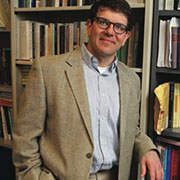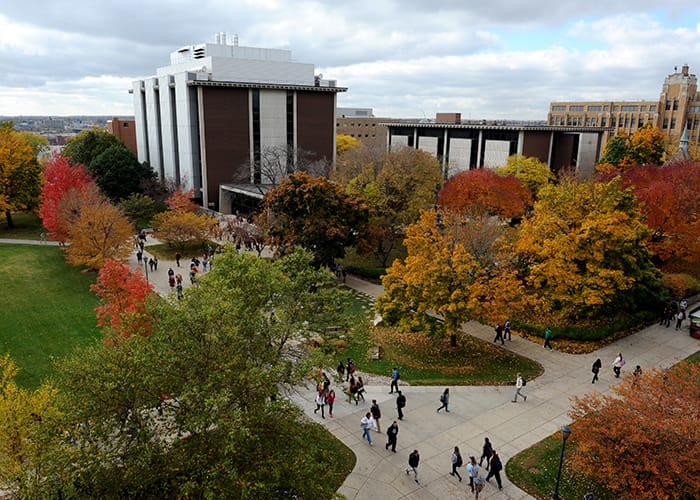2014 Way Klingler Fellowships Award Recipients
 Dr. Ryan Hanley
Dr. Ryan Hanley
Associate professor of political science
The inauguration of Pope Francis and his subsequent teachings have focused on inclusion and introspection, asking the question, what is the role of the Catholic church in the world today? What obligations do we have to citizens of an increasingly complex political and economic climate?
Dr. Ryan Hanley, associate professor of political science and recipient of this year’s Way Klingler Fellowship in the humanities, believes that some of the answers to these questions lie in the teachings of François Fénelon, a French Roman Catholic philosopher and writer. Next year marks the 300th anniversary of his death. “Fénelon is an important, but largely forgotten, Catholic thinker,” Hanley says. “In the 18th century, his book Telemachus was the secondmost read book after the Bible itself. His contributions to both spirituality and political philosophy still hold great value today.”
Hanley will use his Fellowship award — $20,000 annually for three years — to research and publish the first English-language book on Fénelon’s political philosophy.
According to Hanley, Fénelon’s philosophy was rooted in the concept of “pure love” — love untainted by self-love — that aligns with the Jesuit principle of cura personalis.
“One of his main concerns was the politics of inequality, something very much on people’s minds today,” Hanley says. “Inequality in income; global inequality. To hear this Catholic voice describe the flourishing state in which inequality is reduced is likely to resonate with audiences today.”
Hanley is excited to bring this historically important and contemporarily relevant project to life, an opportunity he said he might not have had without the Way Klingler Fellowship.
“You don’t often find opportunities to address something that history missed,” he says. “It’s a perfect blend of my interests in the Enlightenment, political philosophy and my 10 years spent in the mission of Marquette. It all comes together nicely.”
 Dr. Sandra Hunter
Dr. Sandra Hunter
Associate professor of exercise science
Dr. Sandra Hunter, associate professor of exercise science in the College of Health Sciences, is world-renowned for her research on age and sex differences in muscle fatigue. In addition to fielding requests for keynote addresses at international conferences, her work has been commissioned by NASA.
When Hunter sets her sights on a new research opportunity, she does so with a nearly unparalleled tenacity and sense of purpose — qualities that helped make her the recipient of the 2014-15 Way Klingler Fellowship in science, an award that will provide $50,000 annually for three years.
“It’s a huge honor,” Hunter says. “Without this award, this new area of research would not happen.”
Her focus is on Type 2 diabetes, a disease that continues to gain attention as global obesity rates rise.
“Type 2 diabetes is a pandemic — the increase in instances of this disease is absurd,” she says. “That said, there is still not much understanding of the neuromuscular implications that come with it, the fatigue and impairments.”
Type 2 diabetes — the most common form of the disease — affects the body’s ability to properly regulate insulin. Typically thought of as an adult-onset disease, Type 2 diabetes has become an issue in children with rising incidences of childhood obesity.
Hunter’s research will focus on blood flow and fatigue in the central nervous system in non-insulin dependent patients with diabetes. Working with a clinical population will allow her to test her prediction of a blunted blood flow response and greater fatigue in the central nervous system, which she predicts will account for greater muscle fatigue in people with Type 2 diabetes.
Ultimately she hopes to determine how a strength training program can offset the neuromuscular fatigue that Type 2 diabetes patients suffer.
“Exercise can offset some of the effects of this disease,” Hunter says. “It’s the cornerstone of treatment, but people have to want to do it. This study will help understand the mechanisms involved.”


